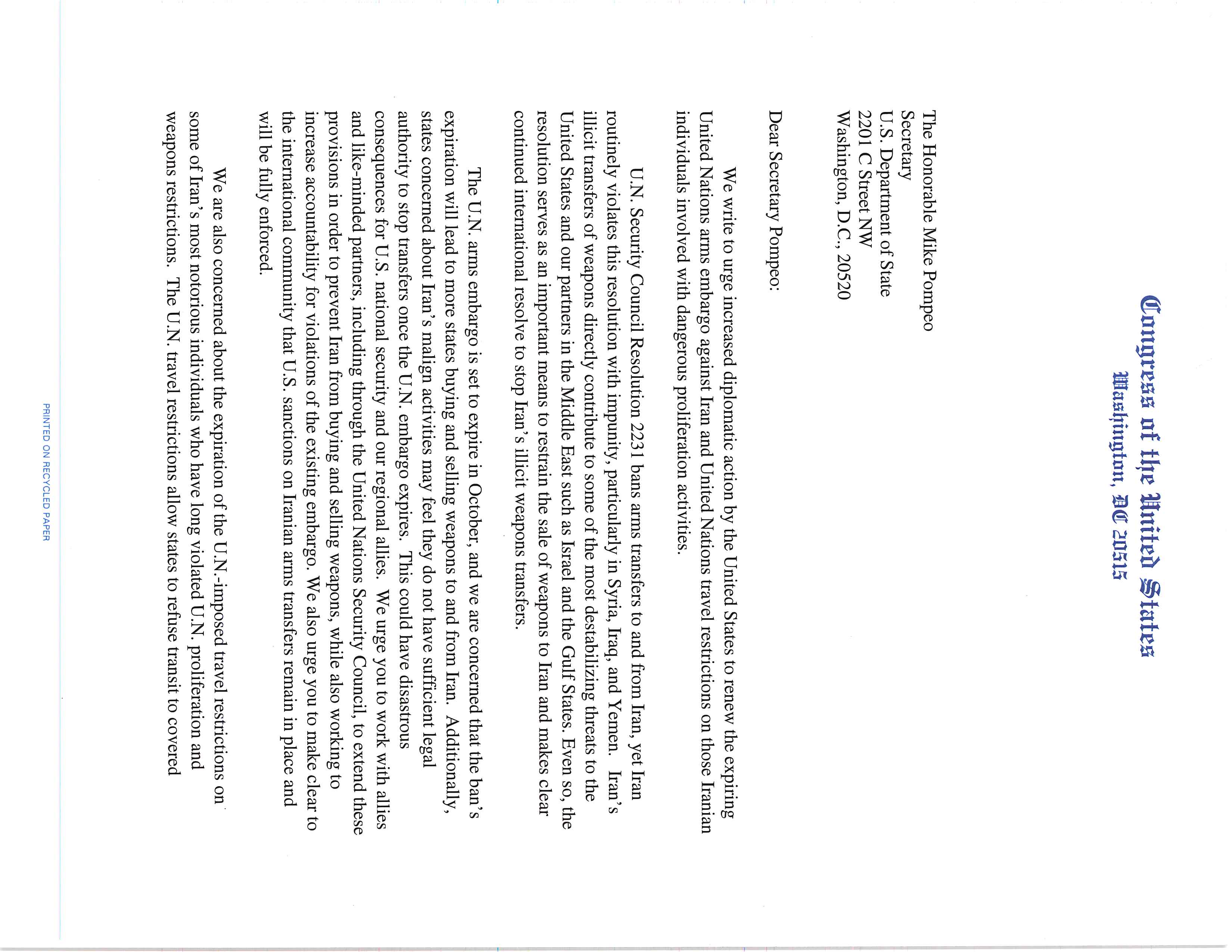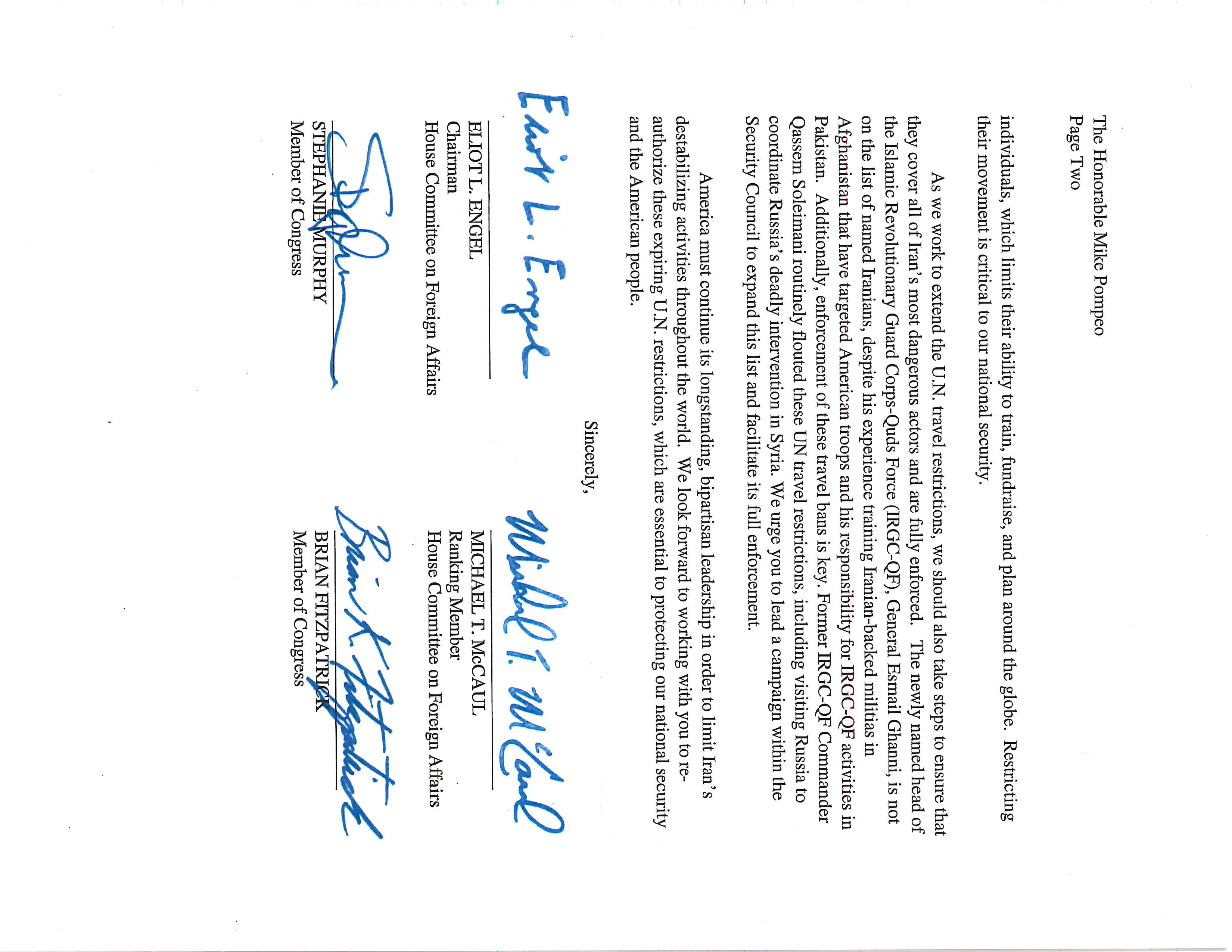Bipartisan Letter to Pompeo Regarding Renewal of UN Iran Sanctions
(May 2020)
’In May 2020, a bipartisan group of 387 members of Congress signed a letter to Secretary of State Mike Pompeo authored by Representatives Eliot Engel (D-NY), Michael McCaul (R-TX), Stephanie Murphy (D-FL), and Brian Fitzpatrick (R-PA) urging him to take “increased diplomatic action… to renew the expiring United Nations arms embargo against Iran and United Nations travel restrictions on those Iranian individuals involved with dangerous proliferation activities.”
The Honorable Mike Pompeo
Secretary
U.S. Department of State
2201 C Street NW
Washington, D.C., 20520
Dear Secretary Pompeo:
We write to urge increased diplomatic action by the United States to renew the expiring United Nations arms embargo against Iran and United Nations travel restrictions on those Iranian individuals involved with dangerous proliferation activities.
U.N. Security Council Resolution 2231 bans arms transfers to and from Iran, yet Iran routinely violates this resolution with impunity, particularly in Syria, Iraq, and Yemen. Iran's illicit transfers of weapons directly contribute to some of the most destabilizing threats to the United States and our partners in the Middle East such as Israel and the Gulf States. Even so, the resolution serves as an important means to restrain the sale of weapons to Iran and makes clear continued international resolve to stop Iran's illicit weapons transfers.
The U.N. arms embargo is set to expire in October, and we are concerned that the ban’s expiration will lead to more states buying and selling weapons to and from Iran. Additionally, states concerned about Iran's malign activities may feel they do not have sufficient legal authority to stop transfers once the U.N. embargo expires. This could have disastrous consequences for U.S. national security and our regional allies. We urge you to work with allies and like-minded partners, including through the United Nations Security Council, to extend these provisions in order to prevent Iran from buying and selling weapons, while also working to increase accountability for violations of the existing embargo. We also urge you to make clear to the international community that U.S. sanctions on Iranian arms transfers remain in place and will be fully enforced.
We are also concerned about the expiration of the U.N.-imposed travel restrictions on some of Iran's most notorious individuals who have long violated U.N. proliferation and weapons restrictions. The U.N. travel restrictions allow states to refuse transit to covered individuals, which limits their ability to train, fundraise, and plan around the globe. Restricting their movement is critical to our national security.
As we work to extend the U.N. travel restrictions, we should also take steps to ensure that they cover all of Iran’s most dangerous actors and are fully enforced. The newly named head of the Islamic Revolutionary Guard Corps-Quds Force (IRGC-QF), General Esmail Ghanni, is not on the list of named Iranians, despite his experience training Iranian-backed militias in Afghanistan that have targeted American troops and his responsibility for IRGC-QF activities in Pakistan. Additionally, enforcement of these travel bans is key. Former IRGC-QF Commander Qassem Soleimani routinely flouted these UN travel restrictions, including visiting Russia to coordinate Russia’s deadly intervention in Syria. We urge you to lead a campaign within the Security Council to expand this list and facilitate its full enforcement.
America must continue its longstanding, bipartisan leadership in order to limit Iran’s destabilizing activities throughout the world. We look forward to working with you to reauthorize these expiring U.N. restrictions, which are essential to protecting our national security and the American people.
 |  |


